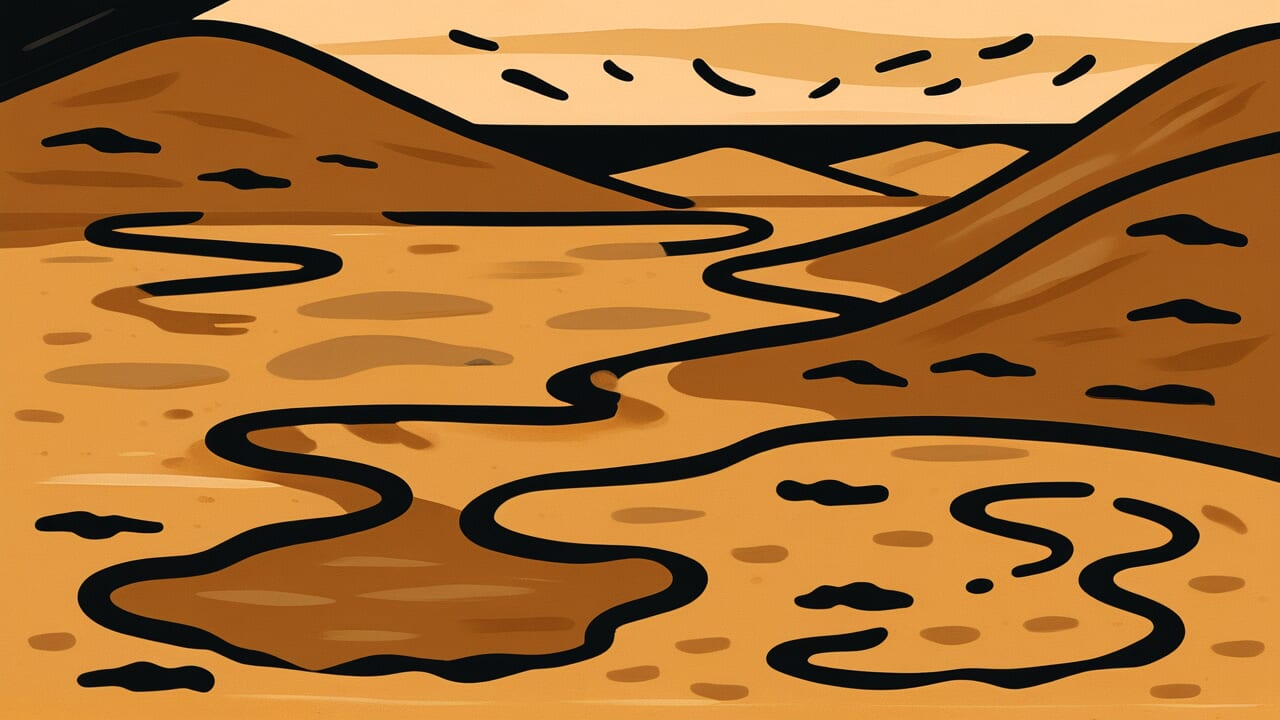How to Read “White sand in mud becomes all black with it”
Hakusa wa deichū ni arite kore to mina kuroshi
Meaning of “White sand in mud becomes all black with it”
This proverb means that even honest people become corrupted when they stay in bad environments.
No matter how strong your character or willpower, it’s extremely hard to resist influence when you’re surrounded by dishonesty and wrongdoing.
People use this saying when giving advice about job assignments or friendships. They also use it when reflecting on their own life choices.
For example, you might express concern about a talented young person joining a problematic workplace. Or you might point out the dangers of continuing friendships with bad influences.
This expression works because it uses a visual image to show a powerful truth. Your environment can be stronger than your personal will or character.
Even today, we recognize that workplace culture and friendships greatly affect our behavior and values.
This proverb remains relevant when teaching the importance of carefully choosing where you spend your time.
Origin and Etymology
This proverb likely comes from ancient Chinese philosophical thought.
“White sand” means pure white sand. “In mud” refers to being surrounded by mud. The saying teaches that pure things become dirty when placed in dirty environments.
Ancient Chinese thinkers deeply explored human nature and education. The idea that “environment shapes people” was an important theme in both Confucianism and Taoism.
Just as white sand looks black when mixed with mud, even people with pure character struggle to escape bad influences in corrupt environments. This is the warning contained in these words.
The expression brilliantly uses physical properties as a metaphor for moral character.
The sand itself doesn’t change, but the surrounding mud makes it appear black. This visual image helps people intuitively understand the power of environment.
The proverb came to Japan along with classical Chinese learning. The samurai class especially used it as a warning about choosing one’s surroundings carefully.
No specific first written source has been identified. However, Japanese moral instruction books influenced by Chinese classics have long quoted it when explaining the importance of environment.
Usage Examples
- That serious guy changed after transferring to that department. White sand in mud becomes all black with it—environment is truly frightening.
- I worry about my son’s friends. White sand in mud becomes all black with it, so I’m anxious he might be influenced by bad company.
Universal Wisdom
This proverb has been passed down because it speaks to a universal truth. Human willpower is weak, and environment has overwhelming influence.
We want to believe we’re strong. We want to think we can stick to our beliefs in any situation. But reality shows that humans are far more influenced by their surroundings than they imagine.
The influence of environment is frightening precisely because it’s invisible.
At first, you think “I’m different.” But the values of people you meet daily, the unspoken rules at work, and the group atmosphere gradually change your perspective.
Where dishonesty is routine, dishonesty starts to seem normal. Where lying is common, honesty starts to feel foolish.
This isn’t weakness of will. It’s a fundamental characteristic of being human.
Our ancestors understood this human nature deeply. That’s why they warned that even people with excellent qualities can fall if they choose the wrong environment.
Like white sand appearing black in mud, a pure heart looks dirty in a bad environment. And it doesn’t just look dirty—it actually becomes dirty.
Facing this harsh reality is the first step to protecting yourself. This is what the proverb teaches.
When AI Hears This
White sand turning black in mud is actually a miniature version of physical laws that govern the entire universe.
According to the second law of thermodynamics, entropy—or disorder—always increases in closed systems. In other words, things that were neatly separated naturally mix together and become indistinguishable.
Drop one drop of ink into a glass of water. At first, the boundary is clear, but over time it spreads throughout.
This is the natural flow of molecular diffusion, and it never reverses. The relationship between white sand and mud is the same.
Mud particles constantly move around and attach to the surface of white sand. Thinking probabilistically, among trillions of particles, the number touching the white sand can only increase over time.
What’s interesting is that maintaining whiteness requires continuously injecting energy from outside.
Washing the sand, keeping it away from mud—without such intentional actions, it will inevitably get dirty according to physical laws.
Living things maintain order only because they obtain energy from food and resist internal disorder.
In other words, purity isn’t a natural state. It’s a “non-equilibrium state” created through continuous effort.
If left alone, assimilation with the environment is the universe’s basic rule. This is what physics teaches us.
Lessons for Today
This proverb teaches modern people the importance of choosing their environment. Don’t overestimate your willpower. Seriously examine where you place yourself.
In modern society, our environment is diverse. Your workplace, friendships, people you follow on social media, and media you consume daily all surround you.
All of these influence your values and behavior patterns. If you feel uncomfortable in your current environment, that might be an important signal.
Specifically, spend time with people you respect. Choose places where constructive discussion happens.
Have the courage to distance yourself from relationships that negatively influence you. This isn’t running away. It’s an active choice to protect and grow yourself.
At the same time, remember that you yourself are part of someone else’s “environment.”
Your words, actions, and values influence the people around you. Don’t just seek good environments—become part of a good environment yourself.
With this awareness, you can create a pure atmosphere around you too.



Comments